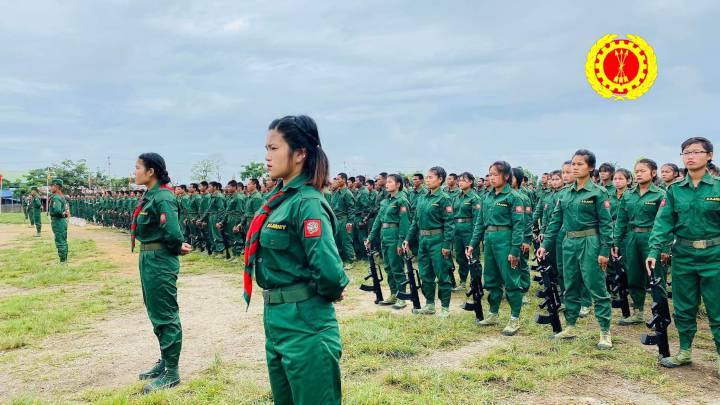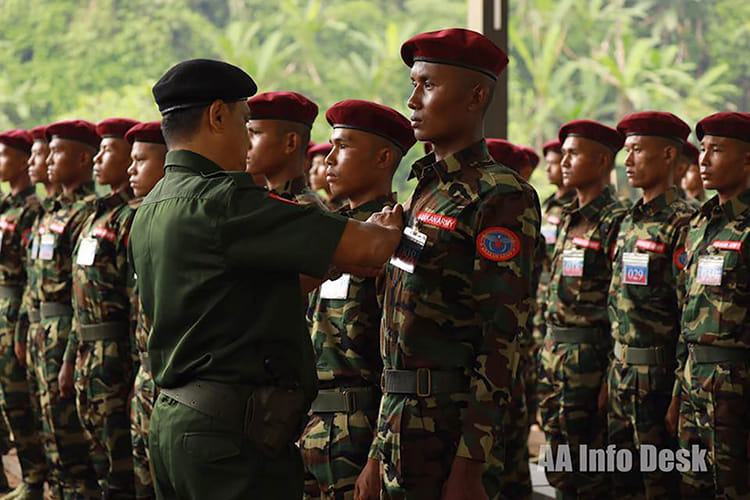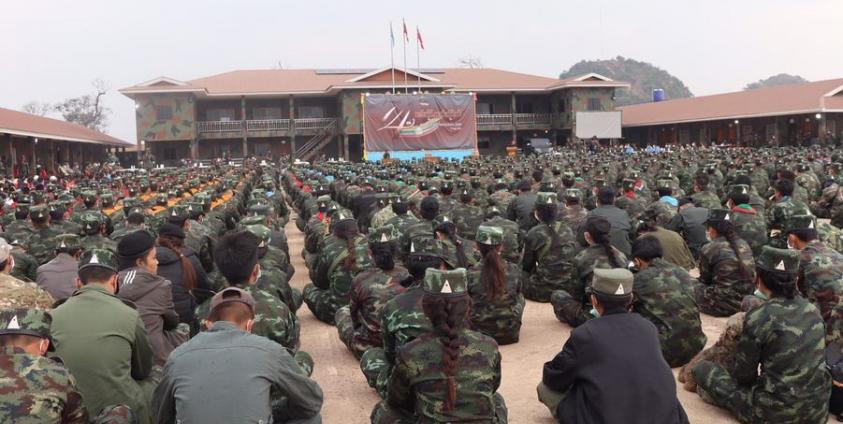Sai Wansai — Whenever we mentioned inter-ethnic conflict we immediately come to think of the armed clashes between the two Shan armies of Restoration Council of Shan State (RCSS) and Shan State Progress Party (SSPP), which are made up of majority Shans, who called themselves “Tai”. In fact, this should be termed as brotherly conflict, while the animosity between the Shan and non-Shan ethnic groups may be termed as inter-ethnic conflict.
Beginning the end of 2015, shortly after the signing of nationwide ceasefire agreement (NCA), the RCSS and Ta’ang National Liberation Army (TNLA) were involved in inter-ethnic conflict, with the latter accusing the former intruding into its controlled territories and the former, arguing that it has been there for decades even before the former was formed.
This inter-ethnic conflict dragged on until 2018 when the northern Shan army SSPP enter the fray on the side of TNLA, with the blessing of seven-member Federal Political Negotiation and Consultative Committee (FPNCC), headed by the United Wa State Army (UWSA). In the course of time, the UWSA also got involved physically to help root out the RCSS, although its troops were disguised as SSPP soldiers wearing their uniforms, according to the local observers. But the Wa denied which not many believe in it.
Lost opportunity for the Shan armies
While Shan Nationalities League for Democracy (SNLD) has always been a vanguard and able to be the spearhead of the non-Bamar ethnic political parties in the struggle for the ethnic rights of self-determination, democracy and equality, leading the United Nationalities Alliance (UNA), which was formed after 1990 national election with 12 ethnic political parties as members; and participation in Committee Representing the People’s Parliament (CRPP) in 2002, together with the National League for Democracy (NLD) headed by Aung San Suu Kyi during the military rule of State Peace and Development Council (SPDC) era, and has always been on the right side of history; the two Shan armies, RCSS and SSPP, don’t come anywhere near to fulfill the aspirations of Shan people, much less trying to liberate the whole country.
The writer is not belittling the non-Bamar ethnic nationality resistance movements or ethnic armed organizations (EAOs), and has no intention at all to look down on their past struggles independently and individually as nonsense, but only pointing out that they all have to take this opportunity as godsend. The awakening of Bamar-dominated population in all the divisions or regions against the military dictatorship and their about-turn acquired political awareness in so short a time, sympathy, understanding of the ethnic nationalities’ plight and their self-determination struggle after all these years of ignorance are almost a miracle. And most of all, the determination of the Bamar population, whatever it takes, to uproot the military dictatorship, once and for all.

SSPP SSA troops Credit SSPP Info
On this score the Shan armies are doing very miserably and could even be seen indirectly as destructive for failing to chip in like the other EAOs in Chin, Kachin, Karenni and Karen states.
Let us look at the situation closely.
Reason for staying aloof
The RCSS although at the start of the Spring Revolution in the aftermath of the military coup last year February gave lip-service that it wouldn’t look at the military government repression of the people with folded arms and even conducted military training twice, with about 200 in each batch, for the youths from Bamar-dominated areas, nothing more than this come up in terms of energizing the people’s revolution or Spring Revolution.
When late last year the RCSS was pushed out by the alliance force of SSPP, TNLA and UWSA from northern Shan State and even lost quite a number of its controlled territories in the south, it started to bank on group survival as a priority than aiming at a big picture of restoration and liberation of Shan State.
Speculation were also rife that it may have even signed a pact with the devil (meaning: the military junta) in order to survive and fend off its immediate enemies, although this is categorically denied by the RCSS.
Whatever the case, the RCSS position is to achieve peace through political dialogue with the junta, which has repeatedly committed crimes against humanity during its one and a half year rule, including all stakeholders if possible, together with the NCA signatories of 2015. To date, out of 10 NCA signatories only 8 were left, as the Chin National Front (CNF) and the Karen National Union (KNU) opted out and joined the Spring Revolution, one way or the other.
It should be noted that except RCSS all the remaining rest six are either small outfit or have no soldiers at all.
As for the SSPP it also gave lip-service to the Spring Revolution but has done nothing in concrete terms. Its position is to follow the lead of the FPNCC, of which it is a member. The UWSA is a fence-sitter and considers the Bamar power struggle between the NLD and junta a sort of palace coup.
Its main thrust is to actively participated in rooting out the RCSS from northern Shan State with the help of TNLA and UWSA. And its territorial expansion into southern Shan State was said to be beefed up by the UWSA although the Wa denied the involvement.
Present situation
In the mean time, on July 14 the junta demanded the SSPP to withdraw from three outposts north of Mong Hsu, in Mong Hsu Township. It has denied thrice and when the SSPP and the junta representatives met in Mong Nong, southern Shan State, the latter again demanded the withdrawal, extending another one week up till July 21 to follow the ultimatum.
Reportedly, the junta has been reinforcing its troops around SSPP bases in Mong Hsu area and the brewing military tension might erupted into full scale war said the locals.
On July 15, the SSPP and RCSS clashed for one hour from 12 noon to 1 pm in Lawksawk Township south of Loi Nguen mountain where the former has been operating and the latter seen marching up to the said area on July 14 by the locals.
In Lawksawk Township the junta’s army, SSPP and RCSS are all present and Lawksawk has Myanmar army cadet training school and other infantry battalions stationed.
At this writing, the uneasy truce between the junta and SSPP is still holding. But nobody knows when the silence will be broken.

AA troops Credit AA Info Desk
AA experience as a guide line
Initially Arakan Army (AA) looked at the UWSA as a model with an administration akin to confederacy setup. The Wa were able to achieve a sort of “state within a state” stature due to the favor received stemming from their mutiny followed by the breakdown of the Communist Party of Burma (CPB) in 1989. The mutinying Wa, including Mong La area under National Democratic Alliance Army (NDAA), were given free reign to develop their territories and that was how it all came about.
The AA might have pinned its hope on such kind of arrangement after the unofficial ceasefire agreement in November 2020 prior to the national election.
Understandably, the AA took the advantage to build up its administrative machinery while also beefing up its troops. It also knows that the junta is not happy and if there is an opportunity it will try to reverse the development achieved by the AA. Thus the mantra has been to try and make the most out while the situation is favorable. Something akin to “make hay while the sun shines”.
But the harassment and disruption of the AA administration apparatus by the rival junta, including lost of patience, might have broken the uneasy peace, as the junta’s aircraft bombed the AA position in Karen State in early July killing six of its soldiers and delivered a few armed clashes prior to it in Arakan State also.
However, the latest out break of firefight maybe the first serious one and the last straw which could pull the AA into a wider conflict with the junta and become a part of the conflict parties within the loose alliance of ethnic-democratic force, willingly or unwillingly.
According to various news outlet including the Western News, Khaing Thuka spokesman of the AA said on Monday July 18, about 20 Border Guard Force (BGF) policemen were killed in armed clashes in Maungdaw where 14 were also taken prisoners.
Reportedly, he said AA forces clashed with members of a Border Guard Force (BGF) twice on Monday morning—once between the villages of Sin Paing Nyar and Sagapin at around 9am, and again between the villages of Done Kalar and Wet Kyein about an hour later.
He confirmed that the group attacked the junta-backed BGF as retaliation for the killing of six AA troops in airstrikes carried out by the junta in Karen State’s Mutraw (Hpapun) District earlier this month.
“Although it was mentioned as BGF they aren’t real policemen. About seventy percent of the Myanmar soldiers changed their uniforms to police uniforms and they are fighting combatants. The BGF and security units responsible for the public safety are not the same, as they are formed solely for combat purpose. The majority of the officers in BGF are from the military,” explained Khaing Thuka to the Western News in an interview.
The EAOs in Chin, Kachin, Karenni and Karen states are, more or less, already on the same wavelength with the National Unity Government/People’s Defense Force (NUG/PDF) and have been cooperating on different levels in their fight to uproot the military junta and its military dictatorship system.
But it is fair to also point out that the NUG needs to walk an extra mile in trust-building with the ethnic nationalities by speeding up the federal union constitutional drafting in all-inclusive manner that all could live with.
Analysis
The inactivity of the two Shan armies, at least to be on loose alliance with all the anti-junta regime forces and failing to side with them, may be because both have an eye more on “group survival” than the commitment to strive for a bigger picture of “Shan unity, Shan State’s ethnic groups unity, and fulfillment of the Shan people’s rights of self-determination aspirations”.
This situation may be compounded by the having to look at and follow their handlers’ wishes, rather than the people of Shan State.
SSPP has openly said time and again that it has to consider the FPNCC position as a priority, which means it has to dance to the Wa’s tune. But why doesn’t it take the example of the Kachin Independence Army (KIA) which despite being a FPNCC member conduct its own policy as it sees fit.
RCSS also has a handler across the border and it largely follows what the neighboring country across its Loi Taileang headquarters want than what it really want to do or should do for the people of Shan State.
In this sense, the two Shan armies may be well advised to independently lay down policies on what would benefit the people of Shan State, and as an extension for the whole country.
As have always been said, we can’t win this fight alone. Now that there is an opportunity to fight together in unison to uproot the military dictatorship, the two Shan armies should make the right choice and empower the revolving ethnic-democratic alliance in the making.
Forget about peaceful negotiation with the junta to extract benefit individually like the Wa. The situation is not the same and who knows how long the junta will be around. It won’t happen, the AA is the proof and it is realizing it now.
Just strive for unity among the Shan/Tai first, follow by all ethnic groups unity within Shan State, and unity among all ethnic nationalities and groups countrywide.
Finally, the day Shan State and Arakan State enter the people’s revolution fray it will be the beginning of the end of Burmese military junta rule.
Photo : RCSS SSA toops at Loi Tai Leng
SSPP SSA troops Credit SSPP Info
AA troops Credit AA Info Desk







